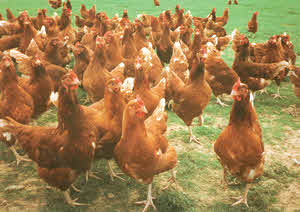 Registered Certification Bodies for Other Standards
Registered Certification Bodies for Other Standards
There are several other sets of standards which are not necessarily organic but which nevertheless are relevant. Most of their recommendations are already covered by the organic standards.
Farm Animal Welfare Council Recommendations (FAWC)
This is an independent advisory organisation that was set up by the Government in 1979. It keeps the welfare of livestock under review and advises on changes that may be necessary. It emphasises the five freedoms that are essential:
- Freedom from hunger and thirst –
by ready access to fresh water and a diet to maintain full health and vigour. - Freedom from discomfort –
by providing an appropriate environment including shelter and a comfortable resting area. - Freedom from pain, injury or disease – by prevention or rapid diagnosis and treatment.
- Freedom to express normal behaviour – by providing sufficient space, proper facilities and company of the animal’s own kind.
- Freedom from fear and distress –
by ensuring conditions and treatment which avoid mental suffering.
Code of Recommendations for the Welfare of Livestock
DEFRA have produced a range of free advisory publications for poultry and livestock. They are available from DEFRA but are not organic in coverage.
Freedom Food
This is a subsidiary of The Royal Society for the Prevention of Cruelty to Animals (RSPCA). It was set up to provide minimum welfare standards, but these do not specify free-range or organic as necessities. Producers who are registered with them can use their logo on packaging for their produce. Some producers are registered as organic and Freedom Food and use both logos on their produce.
Free-range
Free range is a Special Marketing Term (SMT) that was originally defined by the Egg Marketing Regulations. Eggs described as ‘free range’ must be produced by hens that are kept at a maximum of 2,500 birds per hectare (2.47 acres) and have continuous daytime access to open air runs. The regulations also cover details of housing, size of pop-holes, and so on. All organic poultry must be on free-range, but all free-range poultry do not necessarily conform to organic standards.
The organic standards include most of the requirements specified by free-range regulations, as well as the conditions that are specific to organic management. However, there is variation between the different certification bodies.For example, the basic standards that are followed by most, state that birds should have access to range when weather conditions are suitable and for at least one third of their lives. The Soil Association standards are more stringent. They require birds to have easy access to range during daylight hours, and for the minimum periods indicated below:
- Layers: all their laying lives
- Table chickens: two-thirds of their lives
- Ducks: two-thirds of their lives
- Geese: two-thirds of their lives
- Turkeys: two-thirds of their lives
- Guinea Fowl: two-thirds of their lives.
This article is a shortened extract from Organic Poultry by Katie Thear and used with permission of the publisher.
Further Articles on Organic Poultry
- Alternative Organic Poultry Standards for Poultry Keepers
- Organic Poultry, What are Organic Poultry Standards?
- Organic Registered Certification Bodies, Certification Organic Poultry
- Which Organic Poultry Standard to Follow?

